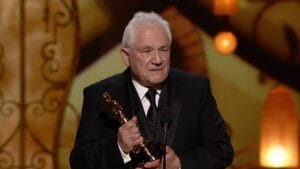Born in London in 1937, Seidler’s upper-middle class Jewish family fled to the United States to escape World War II in a convoy of three ships. Along the way one of the ships, which was carrying Italian prisoners of war, was sunk by German U-boats. Seidler, who was only 3, came away from the experience with a significant stutter, which he attributed to the traumas of war.
Growing up on New York’s Long Island, speech therapy failed to clear his speech, so he decided to keep quiet most of the time rather than make others feel uncomfortable listening to him speak. His childhood hero was King George VI, who had a significant stutter himself, as you might know if you saw the 2010 film, The King’s Speech. “David,” his parents would tell him to be encouraging, “he was a much worse stutterer than you, and listen to him now. He’s not perfect. But he can give these magnificent, stirring addresses that rallied the free world.” At 16, Seidler said, “I had been depressed, but now I was angry — I decided I deserved to be heard.” He tried the same techniques Dr. Lionel Logue used on George VI: speaking with marbles in his mouth, and taking up smoking. The smoking gave him throat cancer, but he was very successful in smoothing out his speech.

He was also successful in his chosen profession: writing for various TV shows starting in the 1960s, as well as TV movies. His first feature (with Arnold Schulman) was Tucker: The Man and His Dream (1988), followed by more. But Seidler’s most notable work? He wrote a screenplay, and his wife suggested he should consider writing it again as a stage play as the “physical confines of the stage would force him to focus on the key relationships in the story, without the distractions imposed by concern for cinematic technique.” He called it The King’s Speech, which he then re-adapted into the screenplay for the 2010 film. It was not only a hit, it won him the Academy Award for Best Original Screenplay. He accepted the award on the behalf of all stutterers: “We have a voice,” he said, “we have been heard.”
Seidler spent a lot of time in New Zealand as his third wife is a Kiwi. After they divorced in 2008, he lived in Santa Fe, N.M. On March 16, “David was in the place he loved most in the world — New Zealand — doing what gave him the greatest peace, which was fly-fishing,” said his manager, Jeff Aghassi, when he died at 86. “If given the chance, it is exactly as he would have scripted it.”

Loved that movie.